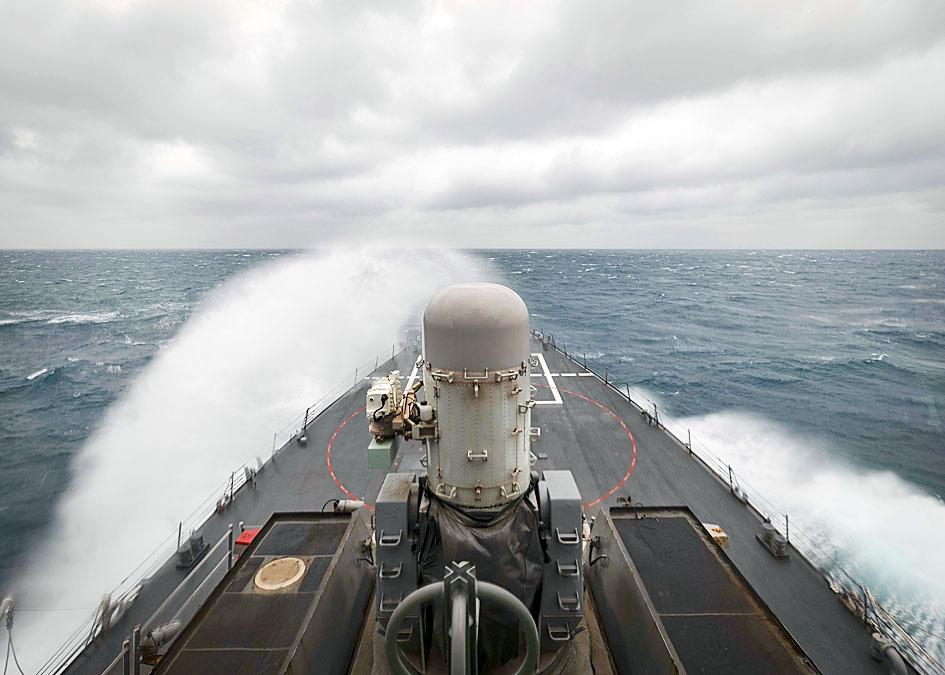The New York-based Council on Foreign Relations (CFR) on Thursday listed a possible conflict between the US and China over Taiwan as a top-tier concern for the first time in its annual Preventive Priorities Survey.
The report assessed the likelihood and effects of 30 potential conflicts that could break out over the next year based on responses from 550 US government officials, foreign policy experts and academics.
Those conflicts are classified into one of three tiers, and the possibility of “intensifying political and economic pressure from China against Taiwan, leading to a severe crisis with the United States,” was classified as a “Tier 1” risk for the first time.

Photo: AP
A US-China conflict over Taiwan was listed as a “Tier 2” risk in 2019 and last year, but was moved up based on its potentially “high impact” on US interests and the moderate likelihood of it occurring, the report said.
A high impact on US interests refers to a contingency that directly threatens the US, a defense treaty ally or a vital strategic interest, and is thus likely to trigger a major US military response, based on the council’s definitions.
A “moderate” likelihood means that there is some chance of an event happening.
By contrast, the possibility of “an armed confrontation in the South China Sea involving China and the United States over freedom of navigation and disputed territorial claims” was downgraded from a Tier 1 to a Tier 2 risk, as it was judged to have a low likelihood of occurring in the coming year.
In addition to a crisis over Taiwan, the council also ranked as Tier 1 contingencies the heightening of military tensions with North Korea over its nuclear program, and an armed confrontation between Iran and the US or one of its allies over Iran’s involvement in regional conflicts and support of militant proxy groups.
Other Tier 1 risks included political instability in Afghanistan, Syria and Venezuela, Russian interference or intimidation against a NATO member, and the possibility of a major cyberattack or terrorist attack on the US.
Paul Stares, director of the council’s Center for Preventive Action, said in the report that the survey is intended to calculate the likelihood of specific contingencies based on the presence of known risk factors.
This ensures that “precautionary measures can be directed toward those [risks] that appear most threatening to lessen the chance that they materialize and reduce the harmful impact if they do,” he said.
The survey only included contingencies in which the US military could plausibly be employed, and therefore excluded other global risks, such as climate change, economic or health-related events, and natural disasters.
It also excluded the risk of domestic unrest or conflict within the US.

SECURITY: As China is ‘reshaping’ Hong Kong’s population, Taiwan must raise the eligibility threshold for applications from Hong Kongers, Chiu Chui-cheng said When Hong Kong and Macau citizens apply for residency in Taiwan, it would be under a new category that includes a “national security observation period,” Mainland Affairs Council (MAC) Minister Chiu Chui-cheng (邱垂正) said yesterday. President William Lai (賴清德) on March 13 announced 17 strategies to counter China’s aggression toward Taiwan, including incorporating national security considerations into the review process for residency applications from Hong Kong and Macau citizens. The situation in Hong Kong is constantly changing, Chiu said to media yesterday on the sidelines of the Taipei Technology Run hosted by the Taipei Neihu Technology Park Development Association. With

CARROT AND STICK: While unrelenting in its military threats, China attracted nearly 40,000 Taiwanese to over 400 business events last year Nearly 40,000 Taiwanese last year joined industry events in China, such as conferences and trade fairs, supported by the Chinese government, a study showed yesterday, as Beijing ramps up a charm offensive toward Taipei alongside military pressure. China has long taken a carrot-and-stick approach to Taiwan, threatening it with the prospect of military action while reaching out to those it believes are amenable to Beijing’s point of view. Taiwanese security officials are wary of what they see as Beijing’s influence campaigns to sway public opinion after Taipei and Beijing gradually resumed travel links halted by the COVID-19 pandemic, but the scale of

A US Marine Corps regiment equipped with Naval Strike Missiles (NSM) is set to participate in the upcoming Balikatan 25 exercise in the Luzon Strait, marking the system’s first-ever deployment in the Philippines. US and Philippine officials have separately confirmed that the Navy Marine Expeditionary Ship Interdiction System (NMESIS) — the mobile launch platform for the Naval Strike Missile — would take part in the joint exercise. The missiles are being deployed to “a strategic first island chain chokepoint” in the waters between Taiwan proper and the Philippines, US-based Naval News reported. “The Luzon Strait and Bashi Channel represent a critical access

Pope Francis is be laid to rest on Saturday after lying in state for three days in St Peter’s Basilica, where the faithful are expected to flock to pay their respects to history’s first Latin American pontiff. The cardinals met yesterday in the Vatican’s synod hall to chart the next steps before a conclave begins to choose Francis’ successor, as condolences poured in from around the world. According to current norms, the conclave must begin between May 5 and 10. The cardinals set the funeral for Saturday at 10am in St Peter’s Square, to be celebrated by the dean of the College